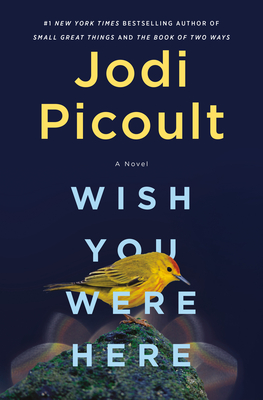
Wish You Were Here:
Chapter 10: Ten
by Picoult, JodiThe chapter “Wish You Were Here” opens with a poignant and disorienting tone, as the narrator questions an unidentified person’s awareness and physical responsiveness. The repeated inquiries—“Can you squeeze my hand? Wiggle your toes?”—suggest a scene of medical urgency or emotional distress, hinting at a possible hospitalization or unconscious state. The fragmented style creates a sense of unease, drawing the reader into the narrator’s concern and confusion.
The central question—“Do you know where you are?”—further emphasizes the disorientation, implying a loss of spatial or cognitive awareness. This line could reflect the perspective of a caregiver or loved one trying to gauge the person’s mental state. The brevity of the dialogue intensifies the emotional weight, leaving room for interpretation about the circumstances. The chapter’s sparse language underscores themes of vulnerability and uncertainty.
The final line—“Where is Gabriel”—introduces a key figure, Gabriel, whose absence or whereabouts is a source of anxiety. This question shifts the focus from the immediate physical state of the person being addressed to a broader emotional or narrative concern. Gabriel’s identity and significance remain ambiguous, adding mystery and prompting readers to speculate about their role in the story.
Overall, the chapter captures a moment of tension and longing, blending physical and emotional disorientation. The minimalist dialogue and unanswered questions create a haunting atmosphere, inviting readers to piece together the context. The title “Wish You Were Here” reinforces themes of absence and yearning, suggesting a deeper narrative about connection, loss, or recovery that will unfold in subsequent chapters.
FAQs
1. What is the significance of the questions “Can you squeeze my hand? Wiggle your toes? Do you know where you are?” in the chapter?
Answer:
These questions appear to be part of a medical or psychological assessment, likely directed at someone who may be disoriented, injured, or in an altered state of consciousness. The questions test basic motor function (“squeeze my hand,” “wiggle your toes”) and cognitive awareness (“Do you know where you are?”), suggesting the chapter may involve a scene of recovery, trauma, or confusion. The tone implies urgency or concern, potentially reflecting a critical moment for a character. The absence of context around these questions also creates suspense, leaving the reader to wonder about the circumstances and the identity of the person being questioned.2. Who is Gabriel, and why is his location important in this chapter?
Answer:
Gabriel is presumably a significant character in the story, given that his whereabouts are directly questioned (“Where is Gabriel?”). His absence or unknown location seems to be a point of concern or mystery, possibly driving the narrative tension in this chapter. The question could imply that Gabriel is missing, in danger, or somehow separated from the speaker. Alternatively, it might reflect a character’s disorientation or desperation. Without additional context, Gabriel’s importance is open to interpretation, but his name and the urgency of the question suggest he plays a key role in the plot or emotional arc of the story.3. How does the sparse and fragmented style of this chapter affect its tone and meaning?
Answer:
The chapter’s minimalistic and disjointed structure—consisting of only a few short lines—creates a sense of unease, urgency, or confusion. The lack of detailed exposition forces the reader to focus on the implied emotions and unspoken context behind the questions. This style may mirror a character’s fragmented thoughts, a traumatic event, or a moment of crisis. The abruptness of “Where is Gabriel?” with no preamble amplifies its significance, leaving the reader to speculate about the relationship between the characters and the stakes of the situation. The tone feels tense and unresolved, drawing attention to what is left unsaid.4. What might the title “Wish You Were Here” suggest about the themes of this chapter?
Answer:
The title “Wish You Were Here” evokes themes of absence, longing, or loss, which align with the chapter’s focus on locating Gabriel and the possibly distressed state of the speaker. It could imply a physical or emotional separation between characters, a sense of nostalgia, or a desire for connection in a moment of crisis. The phrase might also carry irony—for example, if the speaker is in a situation where Gabriel’s presence is desperately needed but unattainable. The title, combined with the cryptic dialogue, suggests that the chapter explores isolation, yearning, or the fragility of relationships.5. How might this chapter serve as a turning point or pivotal moment in the larger narrative?
Answer:
The abrupt, urgent questions in this chapter could mark a critical juncture in the story, such as a character’s awakening from unconsciousness, a sudden realization, or a moment of crisis that propels the plot forward. The mention of Gabriel’s whereabouts might signal a key conflict or mystery that drives subsequent events. The sparse dialogue leaves room for dramatic revelation, suggesting that the answers to these questions could reshape the narrative. If this chapter follows a moment of tension or precedes a major revelation, its fragmented style may heighten the impact of what comes next, making it a pivotal scene of emotional or psychological significance.
Quotes
1. “Can you squeeze my hand? Wiggle your toes?”
This urgent medical questioning represents a moment of crisis or assessment, potentially indicating a character’s vulnerable state or a critical turning point in the narrative.
2. “Do you know where you are?”
This simple yet profound question speaks to themes of disorientation, identity, and situational awareness, possibly reflecting a character’s psychological or physical dislocation.
3. “Where is Gabriel”
This terse, fragmentary question carries significant emotional weight, suggesting Gabriel’s importance to the speaker while creating mystery about his whereabouts and condition.
